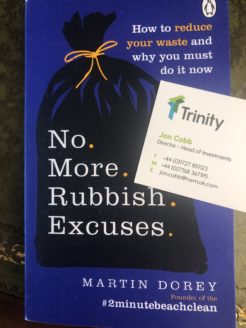Perhaps you are on the start of a journey towards being more environmentally friendly. You know you should be doing more but the task of saving the planet just seems too immense. Is your small effort going to make a difference anyway? In ‘No More Rubbish Excuses’ Martin Dorey encourages us with a definitive ‘Yes’
The Author:
Martin Dorey is the author of the bestselling No More Plastic and the founder of #2minutebeachclean which is a great charity you can read about at https://beachclean.net/
His next offering ‘No More Rubbish Excuses’ is a very easy read. The book gives both thought provoking statistics which will scare/shame us into action, along with practical suggestions that we can take as individuals. Collectively we can make a difference.
A great place to start:
The book took me about 3 hours to read. It is a great place to start if you are looking for a book on this subject. Once you have read it, move on to ‘There is no Planet B’ by Mike Berners Lee which I reviewed at https://www.christianfinancialadvisors.co.uk/insights/blog/review-of-there-is-no-planet-b-my-mike-berners-lee/ or if your interest is more around the economics of sustainability, do read ‘The Economics of Arrival’ which I review at https://www.christianfinancialadvisors.co.uk/insights/blog/review-of-the-economics-of-arrival-by-kathleen-trebeck-and-jeremy-williams/
My personal journey:
I realised that there are still some glaring shortfalls in how I am consuming and therefore increasing the demand for more plastic. Some are embarrassingly obvious such as bottled water which I still use when I go either fishing or hiking. I found the following article from the Independent very helpful in purchasing a reusable water bottle. https://www.independent.co.uk/extras/indybest/outdoor-activity/sports-equipment-accessories/best-reusable-water-bottle-a9388851.html
Dorey gives us the numbers on plastic water bottles and coffee cups, and encourages us to take that further by urging others to do the same. This multiplication factor soon reveals the saving in numbers if, for example, everyone in your office all followed your example and stopped using single use coffee cups.
Single use plastic:
‘Single use.’ That’s a good reminder with regards to all our consumption. We can all do an inventory of every item which gets used once and then discarded. That’s a good place to start with regards to commitments to change our behaviour.
End of Life thinking:
Similarly, Dorey encourages us to think about the end life of every product we buy. What will happen to it once we finish with it? Many of us have got into the habit of looking at the label with regards to calories, and this is a similar kind of discipline.
None of us are perfect. Don’t feel put off wherever you are on this journey. I felt this book was sensitive to this. We can’t all join Extinction Rebellion today but we can all do something.
Planned obsolescence:
Perhaps the most scary chapter was on Electrical and Electronic equipment. This was the chapter which highlighted how we have unknowingly bought into the ‘planned obsolescence’ consequence of consumerism. Planned obsolescence describes a product which is designed to become useless after a period of time or that has a planned demise through a model upgrade (or seasons)
How’s your current phone by the way?
The book gives a powerful example of ‘planned obsolescence’ and can be visualised by visiting the following website: http://www.centennialbulb.org/
This lightbulb has been burning since 1901 because it was made of carbon filaments and not tungsten. I wont ruin the story (buy the book, or borrow it!) but this is a cynical example of there being no profit in a long lasting superior product so once lightbulbs became ‘mainstream’ the major producers got together and agreed to reduce a lightbulbs lifespan so that customers would always need new bulbs.
Conclusion:
A helpful and practical book which has something for everyone.

